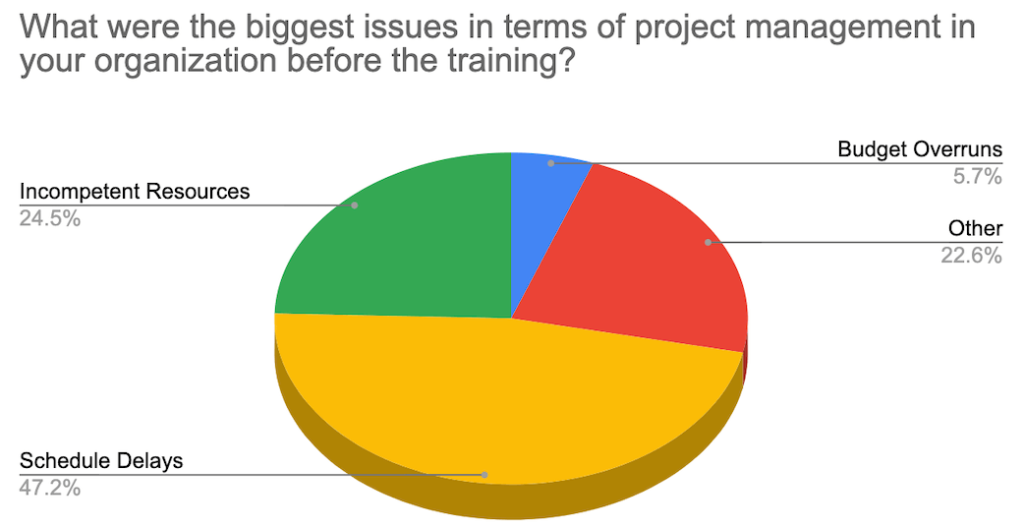If you’re looking to get more out of every team member and push overall performance to new heights, focusing on revenue per employee is one of the best places to start. By strategically investing in Corporate Project Management Training, you can standardize processes, empower teams, and ultimately grow the amount of revenue each employee generates for your organization.
When we surveyed the 425 participants who attended our corporate training programs, schedule delays, incompetent resources, and project cost overruns were the most common issues in project delivery organizations.

Below, we’ll dig deep into how Enterprise Project Management Training enhances three critical benchmarks—Efficiency Indicators, Productivity Benchmarks, and Operational Insights—across an expanded range of industries, including healthcare, pharmaceutical, biotech, construction, auto manufacturing, supply chain, shipping, data center design and development, power generation, and sales.
1. Efficiency Indicator: Streamlining Processes for Higher Output
Standardizing Project Frameworks
One of the core benefits of Corporate Project Management Training is that it teaches teams to operate with a standardized framework. Whether your organization is delivering patient care in a hospital or assembling vehicles in a manufacturing plant, a consistent project structure ensures smoother task coordination. By aligning everyone on the same work breakdown structures and milestones, you minimize confusion and redundancy—paving the way for swift, high-quality project completions.
Real-World Snapshot (Healthcare & Construction):
- Healthcare: A hospital implementing Group PMP Training for nurses, doctors, and admins can sync patient admission workflows with discharge planning. By unifying these processes, they reduce wait times, prevent resource overlap, and improve patient outcomes—all of which positively impact efficiency.
- Construction Management: A construction firm with standardized project stages for planning, procurement, and execution can significantly reduce material and labor waste. By ensuring each phase is well-defined, project managers and site supervisors can more efficiently deploy resources, leading to faster project completions and higher revenue per employee.
How to Build an All-Star Project Team?
Eliminating Common Bottlenecks
From handling task assignments in a biotech lab to scheduling shipping routes, Enterprise Project Management Training helps teams identify risks early and proactively remove constraints. By addressing scope creep, budget overshoot, or logistics gaps, organizations waste less time and prevent recurring workflow disruptions. The result is faster completion rates, consistent output quality, and a clear path to higher revenue per employee.
Key Takeaway:
Many organizations see up to a 20–30% reduction in project delays after rolling out a formal project management framework. Less downtime translates directly into a higher contribution from every team member, regardless of the industry.
How a 1% Enhancement Every 6 Weeks Delivers Game-Changing Results?
2. Productivity Benchmark: Empowering Teams to Do More with Less
Strengthening Cross-Functional Collaboration
In many companies—particularly in sectors like pharma, auto manufacturing, and supply chain—projects require input from multiple specialized departments. A compliance officer may collaborate closely with production engineers; logistics experts might need to coordinate with IT teams. Corporate Project Management Training gives everyone a shared language and understanding of project goals, paving the way for smoother handoffs and clearer responsibilities. When each department knows its role in the bigger picture, the entire workforce’s productivity climbs.
Industry Examples:
- Pharmaceutical: Clinical trial phases involve R&D scientists, regulatory affairs experts, data analysts, and legal teams. After Group PMP Training, these roles work in closer sync. Timely communication reduces data errors, speeds up ethics approvals, and improves documentation.
- Auto Manufacturing: Coordinating design, production, and quality assurance is no small feat. A standardized project approach ensures each unit knows exactly when and how to deliver inputs, cutting down on costly stoppages or reworks.
- Supply Chain: From procurement to warehousing to distribution, well-managed projects keep products moving smoothly. Each employee spends less time on repetitive fixes and more on value-added tasks—directly impacting revenue.
Meet the AI Agents: The New Superheroes for Project Managers
Optimizing Scope and Resource Utilization
Scope creep is a notorious productivity killer. By mastering techniques like Work Breakdown Structures (WBS), change control, and risk management, employees focus on high-impact tasks that deliver the most significant business returns. This targeted approach ensures minimal time is squandered, boosting the tangible output of each team member.
How It Impacts Revenue per Employee:
When teams waste fewer hours on non-essential or misdirected activities, more bandwidth is available for tasks that drive revenue—leading to measurable increases in revenue per headcount.
3. Operational Insight: Making Data-Driven Decisions
Enhanced Reporting and Analytics
A major component of Enterprise Project Management Training is learning to interpret real-time project data—from budgeting forecasts and resource allocation to compliance checks and risk assessments. This data-driven approach empowers more strategic decisions in every sector, whether you’re shipping goods globally, managing a data center build, or running clinical trials.
Healthcare & Data Center Spotlight:
- Healthcare: Hospital administrators who’ve undergone Group Project Management Training can better analyze admission data to allocate staff and manage operating room scheduling. Balancing workload efficiently makes each employee more productive.
- Data Center Design and Development: Understanding usage metrics, project timelines, energy costs, and scalability requirements helps data center managers plan expansions and allocate resources optimally—avoiding unproductive downtime and unnecessary rework.
Building Out a PMO: When It Makes Sense and How to Ensure Long-Term Success?
Strategic Resource Allocation
Trained project managers and executives make more informed calls about where to invest time, money, and human capital. Low-ROI projects can be phased out or re-scoped, freeing up skilled employees for the most profitable initiatives. Over time, this strategic decision-making significantly lifts revenue per employee across a wide range of industries.
Biotech & Power Generation Examples:
- Biotech: When analyzing multiple research avenues, management can use project analytics to decide which lines of inquiry show the strongest ROI potential. Focusing on the most promising projects accelerates time-to-market and increases revenue per staff member.
- Power Generation: Power plants handle intricate timelines, environmental regulations, and varied energy demands. Data-driven project management helps optimize maintenance schedules and upgrade projects so workers aren’t tied up in low-value tasks, effectively increasing each person’s contribution.
Learn more: A Master Class in Delivering Exceptional Projects
A Closer Look at Diverse Industries
Healthcare
Hospitals coordinate multiple departments—emergency rooms, surgical units, labs, and more. With Group Project Management Training, leaders can unify departmental projects, track metrics like patient throughput, and optimize staffing and equipment usage. The result is a more efficient operation where every individual’s contribution is maximized.
Pharmaceutical
Drug companies juggle R&D, clinical trials, regulatory hurdles, and marketing. Enterprise Project Management Training streamlines these workflows, helping each role—be it scientist, project manager, or compliance officer—make more impactful contributions, thereby boosting the revenue generated per employee.
Biotech
From gene therapy to biologics, biotech firms navigate complex innovation cycles with tight timelines. Mastering project management best practices helps prioritize high-potential research and accelerate commercialization. The payoff is a direct increase in per-person productivity.
Construction Management
Managing construction projects involves coordinating architects, contractors, supply vendors, and regulatory agencies. Standardized project structures keep everyone aligned on timelines and responsibilities, reducing costly delays and rework. This efficiency directly boosts revenue per employee as projects finish faster and at lower costs.
Auto Manufacturing
Auto manufacturing relies on synchronized workflows between design, production, quality control, and distribution. Corporate Project Management Training ensures each step is well-defined and efficiently executed. Cross-team coordination eliminates bottlenecks, reducing production downtime and lifting employee output across the board.
Supply Chain
Whether you’re overseeing raw material procurement or final product delivery, supply chain operations involve many moving parts. Through Group Project Management Training, teams learn to manage schedules, optimize routing, and rapidly address disruptions—maximizing each employee’s contribution and cutting waste.
Shipping
Global shipping networks need seamless collaboration among logistics planners, on-the-ground operators, and customs authorities. By adopting project management methodologies, shipping companies can cut transit times and minimize errors—ensuring each employee’s work adds greater value to the supply chain.
Data Center Design and Development
Designing and developing data centers demands precise coordination of construction teams, IT specialists, and environmental regulators. Well-executed project management keeps expansion or upgrade projects on schedule and under budget. The upshot: a higher ratio of revenue generated for every staff member involved.
Power Generation
Power plants juggle regulatory requirements, maintenance schedules, and varying energy demands. Enterprise Project Management Training teaches teams to plan shutdowns and repairs methodically, reducing unproductive downtime. Consequently, each operator and technician adds more value to the operation—raising revenue per employee.
Sales
Sales teams thrive on measurable goals and consistent processes. Through Corporate Training in project management, sales leaders can better structure campaigns, coordinate lead generation efforts, and track performance metrics. Clarity around timelines, targets, and strategies helps each salesperson focus on high-value activities—resulting in a direct bump in revenue per employee.
Discerning the Signal in the Noise: Why It Matters for Project Managers?
Expanding the Impact: Cultural and Organizational Transformation
Fostering a Continuous Improvement Mindset
Once Corporate Project Management Training becomes part of an organization’s DNA, it shapes a culture where learning and process refinement never stop. Employees continually spot new ways to enhance workflows and cut wasted effort. Over time, this ingrained habit of iterative improvement has a massive cumulative effect on efficiency and profitability.
Elevating Team Morale
People thrive in environments with clarity and direction—exactly what Group PMP Training delivers. When employees see real results from streamlined projects and feel their role is indispensable in achieving those results, morale and engagement skyrocket. A motivated workforce consistently drives up revenue per individual.
Enhancing Retention and Reducing Costs
A well-trained, well-supported team is more likely to stay loyal. When employees remain longer, you save on recruitment and onboarding costs—reducing overhead and further improving your revenue-per-employee equation. Over time, the synergy of long-tenured professionals and robust Enterprise Project Management Training creates a powerhouse of efficiency and expertise.
Why “Culture Eats Strategy for Lunch” Is the Key to High-Performing Teams and Organizations?
Conclusion
Focusing on Corporate Project Management Training is one of the most direct and proven paths to lifting revenue per employee. By establishing uniform project frameworks, enhancing productivity, and embracing a data-driven mindset, organizations in industries as varied as healthcare, pharmaceutical, biotech, construction, auto manufacturing, supply chain, shipping, data center design, power generation, and sales can unlock more value from each team member. Beyond the immediate bottom-line impact, organizations also benefit from heightened morale, reduced turnover, and a culture of ongoing improvement.
Ready to take your teams—and your revenue per employee—to the next level? Master of Project Academy’s Group Project Management Training programs equip your staff with the latest project management methodologies, tools, and insights that immediately translate to higher performance. Our Corporate Training solutions focus on real-world application, ensuring your team experiences tangible benefits from day one. Reach out today to discover how our Enterprise Project Management Training can be tailored to meet your industry-specific challenges and propel you to the forefront of your market.
